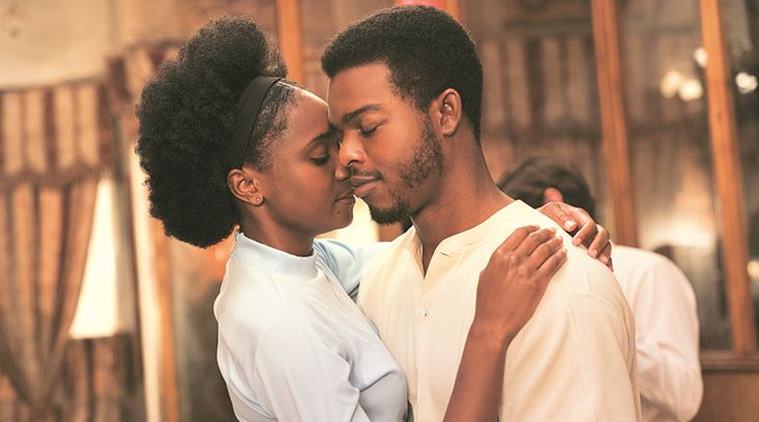 A still from Barry Jenkins’s If Beale Street Could Talk.
A still from Barry Jenkins’s If Beale Street Could Talk.
Some films are like poetry. Sad poetry that speaks to your beating heart, and wrings it and breaks it. Barry Jenkins’s If Beale Street Could Talk is that film. His voice has gone quieter than in Moonlight, which won him the Oscar, but it is equally, if not more, devastating. His source material, James Baldwin’s 1974 novel of the same name, is more bracing in tone; Jenkins distills it with deep respect, and gives us a film of tremendous feeling and power.
How do you react if you are 19, and make love to a man whom you love, and discover that you’ve caught pregnant? And on top of that, find that Fonny, the baby’s father, is going to be imprisoned for a crime he did not commit? Tish, played with tremulous fragility by Kiki Layne, is petrified when she breaks the news to her family. Her family are pillars of support; Fonny’s mother spews venom.
Baldwin’s chronicling of the Black experience in his celebrated novels is second to none. And Jenkins is now doing this in cinema, fifty years on. Fonny, superbly played by Stephan James, displays, in turn, anger, anguish and resignation at the cards fate has played him. He knows, as well as we do, that being Black and being in the wrong place, can still get you killed in America. And staring at a lifetime in jail can be worse than death.
The racism that the characters face in New York in the ’70s is clear and present today. A white cop can pull you out of your car and beat you in full public view on a mere suspicion; in Fonny’s case, it lands him in a place with no return. A film like this makes you want to retire to a quiet place within, and wait till the hurt subsides. But those of us doing time in a film festival have no such luxury, and the next thing I walk into, within a few minutes of If Beale Street Could Talk, is the wildly different Climax by Gaspar Noe.
Noe revels in taking us to hell, and back. That’s his thing. Each film (I Stand Alone, Enter The Void, Alone) has ratcheted up the shock value, taking us higher and higher till we’re laid up, screaming on the rack, wondering just how much we can take before breaking. Or, without exiting the theatre, which is apparently something that makes the director grin.
I saw a bunch of walkouts in Climax. But those of us who stayed back were treated to a sensorium of sound and visuals, which takes place in some kind of a basement taken over by a bunch of young dancers. Noe’s films are a calculated assault on the senses. Here we also get a reason: someone has spiked the drink (a dark fruit-laden punch) available to dancers with acid. The boppin’, stunningly choreographed, leads to the trippin’, and after a while, all we can see are long vertiginous corridors, sexual congress of all manner, blood, vomit, violence: did I leave out anything?
But there’s also feeling. And that redeems and lifts the film. Out of control can feel deviant and delicious, but the consequences can be, as often, beyond the pale. Take care, Noe’s film seems to say, as does the director himself. Gulp, is Noe getting soft? After all this intensity, I’m almost grateful for Steve McQueen’s Widows, a thrill-a-minute heist film, helming some fine female actors and quick, dirty, fully enjoyable action.
Nothing prepares you for this film, made by the director of Oscar-winner 12 Years A Slave, and Shame, which is based on an ’80s TV series. Chicago’s drug-and-violence infested streets we’ve seen before. But not these strong female characters — toplined by Viola Davis — who are widowed when a job their husbands are involved in, goes horribly wrong.
A mobster and his goons and a smooth-talking politician, played by Colin Farrell, are the bad guys. And they are good. But the women are better: not only do they wield guns, they also rear children, and pick up the pieces scattered by their men. They do the wrong thing, but for the right reason, perfect heroes for our conflicted, dark times.